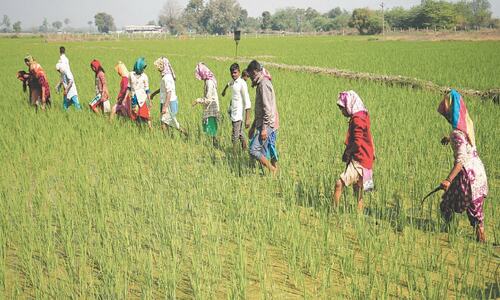SINGAPORE: High food prices in recent years have prompted farmers worldwide to plant more cereals and oilseeds, but consumers are set to face tighter supplies well into 2024, amid adverse El Nino weather, export restrictions and higher biofuel mandates.
Global wheat, corn and soybean prices — after several years of strong gains — are headed for losses in 2023 on easing Black Sea bottlenecks and fears of a global recession, although prices remain vulnerable to supply shocks and food inflation in the New Year, analysts and traders said.
“The supply picture for grains certainly improved in 2023 with bigger crops in some of the key places which matter. But we are not really out of the woods yet,” said Ole Houe, director of advisory services at agriculture brokerage IKON Commodities in Sydney.
“We have El Nino weather forecast until at least April-May, Brazil is almost certainly going to produce less corn, and China is surprising the market by buying larger volumes of wheat and corn form the international market.”
El Nino and food production
The El Nino weather phenomenon, which brought dryness to large parts of Asia this year, is forecast to continue in the first half of 2024, putting at risk supplies of rice, wheat, palm oil and other farm products in some of the world’s top agricultural exporters and importers.
Traders and officials expect Asian rice production in the first half of 2024 to drop as dry planting conditions and shrinking reservoirs are likely to cut yields. World rice supplies tightened this year already after the El Nino weather phenomenon cut into production, prompting India, by far the world’s biggest exporter, to restrict shipments.
While other grains markets were losing value, rice prices rallied to their highest in 15 years in 2023, with quotations in some Asian export hubs gaining 40pc-45pc.
India’s next wheat crop is also being threatened by lack of moisture, which could force the world’s second-largest wheat consumer to seek imports for the first time in six years as domestic inventories at state warehouses have dropped to their lowest in seven years.
Come April, farmers in Australia, the world’s No. 2 wheat exporter, could be planting their crop in dry soils, after months of intense heat curbed yields for this year’s crop and ended a three-dream run of record harvests. This is likely to prompt buyers, including China and Indonesia, to seek larger volumes of wheat from other exporters in North America, Europe and the Black Sea region.
“The [wheat] supply situation in the current 2023/24 crop year is likely to deteriorate compared to last season,” Commerzbank wrote in a note. “This is because exports from important producer countries are likely to be significantly lower.”
Bright side
On the bright side for grain supplies, South American corn, wheat and soybean production is expected to improve in 2024, although erratic weather in Brazil is leaving some doubt.
In Argentina, abundant rainfall over farming heartlands is likely to boost production of soybeans, corn and wheat in one of the world’s largest grain exporting nations.
According to Argentina’s Rosario grains exchange (BCR), 95pc of early planted corn and 75pc of soybeans are in “excellent to very good” conditions, thanks to rains since the end of October across the country’s Pampas region.
Brazil is set for near-record farm output in 2024, although the country’s soybean and corn production estimates have been reduced in recent weeks due to dry weather.
Published in Dawn, December 27th, 2023














































Dear visitor, the comments section is undergoing an overhaul and will return soon.